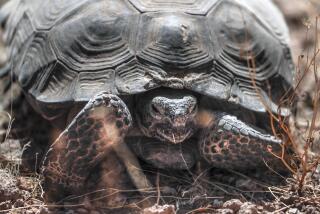Egyptian Crackdown Sought on ‘Desert Safaris’
- Share via
CAIRO — Thirty years ago, the herds of gazelle roaming the sands of Egypt’s Western Desert were so vast that when the turn of a car’s ignition startled them, they would run off in a column almost as long as the horizon, environmentalist Mustafa Saleh recalls.
Now gazelles are an endangered species in Egypt.
Saleh and other conservationists blame hunters from the wealthy Persian Gulf countries and the Egyptian civil servants who issue permits for what are called “desert safaris” -- ostensibly only for the viewing of wild animals.
“Whoever issued the permits doesn’t think very highly of our natural heritage,” Saleh said.
Egypt has 24 Protected Areas, or reserves, that cover 10% of its territory and are run by the Environmental Affairs Agency. Safari permits tend to be issued by military intelligence, but they have to be endorsed by the agency.
Conservationists say agency employees are well-meaning, but that higher political interests can push them into countersigning questionable permits. The permit buyers who are most feared by environmentalists are the rich “Gulfies” who go into the desert in convoys of four-wheel-drive vehicles and stay for three or four weeks of hunting.
“The reason they have to come to Egypt is because they’ve annihilated the gazelle, oryx and houbara populations in their own countries,” naturalist Richard Hoath said. The houbara is a long-legged bird as big as a large chicken whose meat is believed to be an aphrodisiac in the Persian Gulf region.
Hoath recently published “A Field Guide to the Mammals of Egypt,” which covers everything from bats to leopards. He was deliberately vague about the location of certain species for fear that poachers would use the book.
A scientific advisor in the environmental agency, Sherif Baha Din, acknowledges that permits are getting into the wrong hands. “The people who give them [permits], probably they are aware that they are abused,” he said.
Earlier this year, the English-language magazine Egypt Today reported that a hunting party led by an unidentified Cabinet minister from a Persian Gulf country had roamed the Western Desert for three weeks, entering the Siwa reserve and killing 42 antelope, including “what may have been the last slender-horned gazelle in the world.”
The slender-horned gazelle is found only in Egypt and Libya. Experts say nobody knows how many survive.
The head of the agency’s nature conservation sector, Moustafa Fouda, said rangers in Siwa had spotted slender-horned gazelle a month after the magazine report. He also dismissed the toll reported by Egypt Today as “exaggerated,” saying he had received the remains of only one gazelle from the February hunt, despite repeated requests to people in the area for evidence.
Whatever the toll, conservationists such as Saleh and Hoath contend that wealthy, influential visitors are getting away with hunting endangered species in Egypt.
Hoath said the environmental agency “simply doesn’t have enough clout” to stand up to ministries, such as Interior and Foreign Affairs, that might ask for permits for VIPs from the Persian Gulf.
Fouda, the agency’s conservation director, denies this. “I am a very, very powerful person,” he said. “I implement the law by all means.”
But Din, the advisor to the agency, agrees that it lacks power within the government. “It’s a political reality,” he said.
Din said the Siwa hunting party reported on had no permits, “which is positive in a way, because sometimes the problem that depresses a lot of us is that [the poachers] have some sort of permit.”
Mahmoud Kassoumi of the Federation of Tourist Chambers said he complained to the government last year about the granting of safari permits to wealthy people from the Persian Gulf. He said he wrote that permit buyers believed that “they can go into the desert and do whatever they want.”
Kassoumi said Fouda, the agency’s conservation chief, is dedicated, but that “he needs the support of the higher levels, and I don’t think he has that.”
Egypt’s record in protecting wildlife is not good. Hippopotamuses have long disappeared from its part of the Nile. Hunters also wiped out Egypt’s addax antelope and scimitar-horned oryxes.
The problem seems to boil down to three factors:
* Lack of resources. Fouda said hunters often had four-wheel-drive vehicles more powerful than rangers’ trucks. At least twice in Siwa, suspected poachers “ran away very, very fast” when approached by rangers.
* Failure to enforce the law. Din said calls for tougher legislation missed the point, arguing that “the issue is implementation” -- a problem that was widespread with all laws in Egypt.
* Lack of awareness of the value of wildlife. Saleh, the environment consultant, said some civil servants who issued permits to suspected poachers thought that wildlife was “something that they can give away.”
More to Read
Sign up for Essential California
The most important California stories and recommendations in your inbox every morning.
You may occasionally receive promotional content from the Los Angeles Times.










